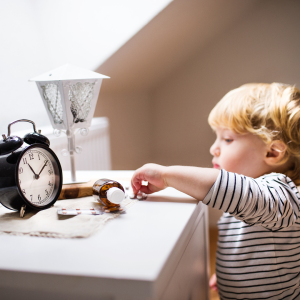National Poison Prevention Week – Stay Alert around Children
 It can happen practically in plain view especially when parents or caregivers are distracted. Accidental poisoning is one of the top causes of child injury and often involves the unintentional ingestion of medications, household products or even items like batteries or coins.
It can happen practically in plain view especially when parents or caregivers are distracted. Accidental poisoning is one of the top causes of child injury and often involves the unintentional ingestion of medications, household products or even items like batteries or coins.
- Medications: One of the most common reasons for an accidental poisoning in a child is ingestion of a medication that is not prescribed to the child or an overdose of their own medication or vitamins. The Centers for Disease Control and Prevention (CDC) notes that medication poisonings are twice as common as poisonings from other household products. Be particularly vigilant with adult heart and blood pressure medications when small children are around. If ingested by a child, these medications can drop the heart rate or blood pressure significantly, possibly causing a child to lose consciousness. Also, adult blood-thinning medications can be extremely dangerous and cause hemorrhaging in a child.
To figure out how many pills a child may have swallowed, count how many pills are left. If you aren’t sure, call the Illinois Poison Center, which can help you determine if a trip to the Emergency Department is necessary. If you go to the Emergency Department, take the pills with you. Sometimes, even one pill can be dangerous to a small child. Your child may need blood drawn to determine if any medication is in their system.
- Coins and ‘button’ batteries: In some situations, swallowing a coin or button battery (found in products like watches and digital thermometers) can cause significant injury to the stomach or poison the bloodstream. If a child swallows a coin, it’s likely they will need an X-ray to determine its location. Parents will need to monitor the child’s stools for the next few days to see if it passes through their system. Batteries, if left too long in the body, can interact with stomach acid and burn the stomach lining. Sometimes, these need to be removed surgically with a scope.
- Household chemicals and pesticides: Like most medications, these products usually taste so bad that if a child does accidentally try something, there won’t be much ingested. One possible exception is antifreeze, which looks like Kool-Aid and unfortunately doesn’t taste terrible. Drinking too much of this chemical can cause kidney damage. Keep household cleaners and outdoor pesticides in protected storage, away from a child’s natural environment.